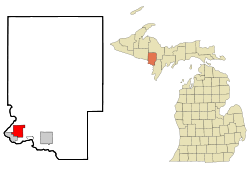Iron Mountain
| Iron Mountain | |
|---|---|
 town hall |
|
| Location in Michigan | |
| Basic data | |
| Foundation : | 1879 |
| State : | United States |
| State : | Michigan |
| County : | Dickinson County |
| Coordinates : | 45 ° 49 ′ N , 88 ° 4 ′ W |
| Time zone : | Central ( UTC − 6 / −5 ) |
| Residents : | 7,624 (as of 2010) |
| Population density : | 409.9 inhabitants per km 2 |
| Area : | 20.2 km 2 (approx. 8 mi 2 ) of which 18.6 km 2 (approx. 7 mi 2 ) is land |
| Height : | 347 m |
| Postcodes : | 49801, 49802, 49831 |
| Area code : | +1 906 |
| FIPS : | 26-40960 |
| GNIS ID : | 0629079 |
| Website : | www.cityofironmountain.com |
| Mayor : | Bruce Rosen |
Iron Mountain is a small town ( city ) in the northwest of the US state Michigan . The city is part of Dickinson County and is its administrative seat . At the 2010 census , Iron Mountain had 7,624 residents.
The Pine Mountain Jump ski jumps are located just outside the city limits .
location
Iron Mountain is located on Michigan's Upper Peninsula . The Menominee River flows past close to the city to the west and south. This forms the border with Wisconsin . To the southwest, Iron Mountain is bordered by Kingsford . The urban area includes several hills and lakes. Pine Mountain is to the northwest, Millie Hill east of downtown; Crystal Lake in the southwest. In addition, the city has a share in the 3 km² Lake Antoine .
Ford Airport , a small regional airport , is located between Iron Mountain and the river to the west . The US Highway 2 is the most important national road connection
history
The town was founded in 1878 when John S. Friedricks found iron ore on Millie Hill. The main vein, the Chapin Mine , was discovered the following year and a mining settlement emerged. In the fall of 1879, a railway line from nearby Quinnesec reached the young settlement. In 1880 the mines were already delivering almost 40,000 tons of iron ore, and the first school was opened in the autumn of the same year. At the beginning of 1886, almost 8,000 people lived in the place, which still belonged to the Behre township . Iron Mountain was incorporated as a village in 1887 and raised to a city as early as 1888. At the 1890 census, the young community had 8,599 inhabitants.
The iron ore mining remained the economic backbone of the city for several decades. The Chapin Mine closed in 1934 during the Great Depression. By then it had delivered 23 million tons of ore. The last mines in the region closed in the 1960s. A relic of the mining era in Iron Mountain is the Chapin Mine Steam Pump Engine , the largest steam-powered pump ever built in the United States. Today, up to 50,000 bats hibernate in the mine at Millie Hill, the Chapin mine partially collapsed in 1940 and formed a lake.
The most important industry in Dickinson County and thus for Iron Mountain today is the wood and paper industry. Verso Paper's facility eight kilometers east of the city in Quinnesec is the largest paper mill on the Upper Peninsula. In addition, the tourism is important.
sons and daughters of the town
- Walter Samuel Goodland (1862–1947), politician and governor of Wisconsin
- Robert J. Flaherty (1884-1951), documentary filmmaker
- Thomas Lawrence Noa (1892–1977), Roman Catholic Bishop in the Diocese of Marquette
- Albert J. Wilke (1895–1977), politician and Senator from Michigan
- Gene Ronzani (1909-1975), American football player and coach
- John Biolo (1916-2003), American football player
- James Harvey (1922–2019), politician and Congressman
- Tom Izzo (* 1955), basketball coach
- Steve Mariucci (born 1955), American football coach
- Frank Pipp (* 1977), racing cyclist
Individual evidence
- ↑ quod.lib.umich.edu
- ↑ miningartifacts.org: MICHIGAN IRON MINES
- ↑ Michigan Department of Natural Resources: Millie Mine Bat Viewing Site ( Memento of the original from May 9, 2012 in the Internet Archive ) Info: The archive link was automatically inserted and not yet checked. Please check the original and archive link according to the instructions and then remove this notice.
- ↑ hunts-upguide.com
